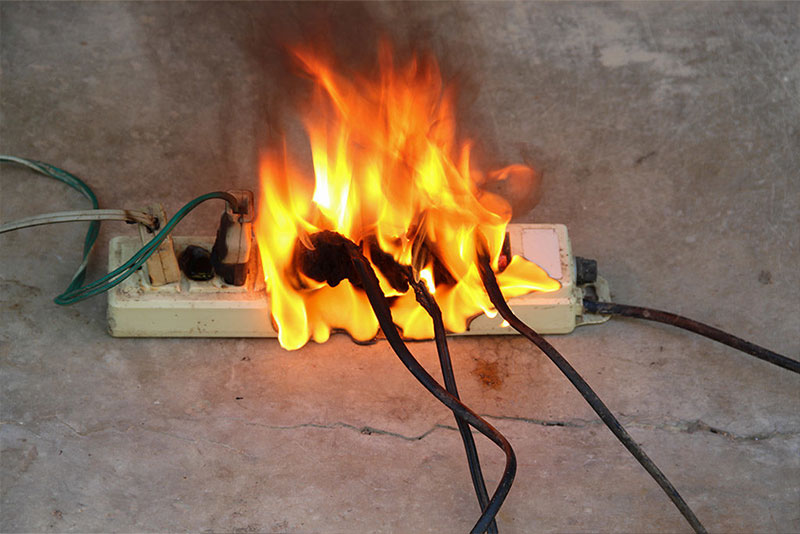Did you know that, every year, over half of accidental domestic fires in the UK are caused by electrical faults or the misuse of electrical items?
Furthermore, the majority of these electrical fires start in the kitchen, with cooking appliances and white goods being the main cause. Not a surprise you may think given the number of electrical items found in the typical domestic kitchen, but it's still fairly shocking that the number of fires is so high in the modern age.
To do something about it, there are several things you can, and should, do to keep homes and loved ones safe from electrical fires.
What you SHOULD do to avoid electrical fires
- Ensure that any electrical installation is checked or performed by a registered electrician
- Check sockets regularly. If you see burn marks or they feel hot, get a registered electrician to check if they need repairing or replacing
- Don't overload your plug sockets. Even when using extension leads, overloading sockets can have disastrous consequences. Have additional sockets professionally installed to reduce the risk of fire if necessary
- Turn off any electrical appliances that you are not using, particularly at night when a fire can quickly spread unnoticed and cause greater danger and damage
- Check flexible cables to appliances before plugging them in to use. Check for damage or wear, and that the plug is fastened securely to the cable. Do not use it unless both the plug and the cable are in good condition
- Be extra careful when using hand-held electrical appliances. Make sure that you switch them off and unplug them once finished. This is particularly important with items that get very hot in normal use (e.g. hair dryers, straighteners etc). If left on, these can get extremely hot and easily cause any material to combust and catch fire
- Call the Fire & Rescue Service immediately if you smell burning that cannot be explained. They will have equipment such as thermal imaging cameras that can detect objects that are overheating
What you SHOULD NOT do
- Never overload electrical adaptors by plugging too many appliances into one socket, especially appliances with a high electrical current rating such as kettles, irons, and heaters. To help get an idea of how many plugs can be safely plugged into one socket check out the Socket Overload Counter on our website
- Do not put electric heaters near curtains or furniture or dry clothes on them. Electrical systems do not like damp or wet conditions!
- Do not cover the air vents on storage heaters or fan heaters. Always leave plenty of room for the ventilation of warm air
- Never trail flexible cables under carpets or rugs
- Do not use a blub with a higher wattage than printed on the light fitting or lampshade you are using
- Do not convert devices or appliances using after-market tech. Always follow the manufacturer's instructions and use the plugs or cables provided by the manufacturer
Electrical Safety First also have an app that is available to help carry out visual checks around the house. You can find out more about this on their website http://www.electricalsafetyfirst.org.uk/guidance/safety-around-the-home/visual-checks/
The Firechief® range includes high-performance fire extinguishers, fire blankets, first aid kits, lithium-ion fire extinguishers and the Kitchen Stove Guard. For more information, call us on +44 (0)330 999 0019 or email sales@firechiefglobal.com.
Disclaimer
The information contained within this blog is provided solely for general informational and educational purposes and is not intended as a substitute for professional advice. Before taking any actions based upon this information, we advise the reader to consult any and all relevant statutory or regulatory guidance and where felt necessary to consult a qualified fire or industry regulation professional. The use or reliance on any information contained herein is solely at the reader's risk.

